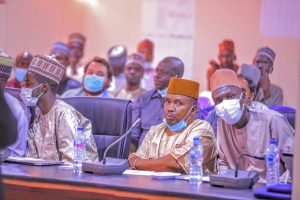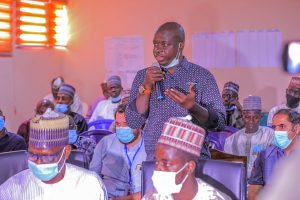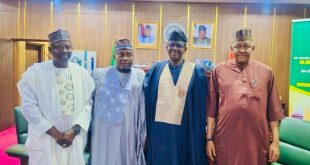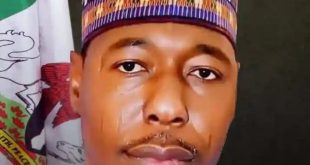… Says only 11 communities restricted on aide
Borno State Governor, Babagana Umara Zulum on Tuesday met with International and Local Non-Governmental Organizations, as well as civil societies during which he once again explained the State Government’s decision for closure of IDP camps and restrictions place of food aide in resettled communities.
The meeting came at a time Governor Zulum has released billions of Naira, distributed to 115,000 safely resettled IDPs in 11 communities. Amongst them, each household made up of a husband, wife, and few children were given N200,000, while widows were given N150,000 each with large quantum of food.
The intervention was meant for IDPs who have been given newly built houses and reconstructed homes, to use as livelihoods through operating small businesses, while a committee was set up to regularly monitor their progresses, and also deploy food aide intervention where the need arises. Zulum wanted the resettled IDPs to be supported in growing businesses as sustainable means of livelihoods, rather than lining them up every day and taking their pictures during distribution of food rations.

Zulum’s meeting with the iNGOs included the UN representatives, and it was facilitated by the Borno State’s Agency for Coordination of Sustainable Development and Humanitarian Response (BACSDAHR), which coordinates and monitors the activities of all humanitarian and developmental partners, including international and national non-governmental organizations (iNGOs/NNGOs) and civil society/community-based organizations (CSOs/CBOs) operating in Borno State. The meeting held at the State’s secretariat in Maiduguri.
While addressing the humanitarian partners, Zulum after expressing gratitude to the partners, said: “You are all aware of the (horrible) situation in the IDP camps, and the conditions of people in these IDP camps in the State, the menace of increasing drug abuse, prostitution, Gender Based Violence, increased risk of epidemics like cholera and meningitis, as well as increased risk of COVID 19.
You are all aware that Muna camp for example is adjudged to be one of the worst camps in the world.
In terms of amenities, it is a camp where many of you would not want to keep your dog or a pig” Zulum said.

He added that in Borno, “people living in IDP camps are tired, and many decided that they wanted to go back to their communities. For example, people from Nganzai decided to move by themselves, people from Damasak moved from the camps in Niger by themselves, and we were told with facts that people were determined to go back and restart their lives with or without Government”.
The Governor explained three options were proposed over camp closure.
“In line with the Borno State Resettlement Plan, and the Return Strategy as agreed by the Government and our partners, we set out to voluntarily return and resettle our people where security permits.
In the voluntary resettlement and return efforts, we offered three options for our brothers and sisters:
1. People can leave the camp and go into Maiduguri township, and we give them money to rent house for a year in addition to food that will last them about 3 months.They can enrol for our SME Micro credit grant program for SMEs.
2. People can leave the camp, and safely go back to the newly built houses in their LGA headquarters or villages, where the military has given us security clearance and other civil security agencies are ready to deploy civil security
3. People can also choose to remain in an IDP camp in which case, we move them to another camp, merged to give way to the return of public services. In some of these camps such as the Mohammed Goni College of Legal and Islamic Studies (Mongolis), the camp resumed back to its original function as a school and the NYSC camp returned to its National Youth Service camp status.
Camp Merger is an Internationally recognised practice” Zulum said.
… Says only 11 communities restricted on aide
Also in his address to humanitarian partners, Governor Zulum explained while humanitarian workers were encouraged to continue supporting IDPs in camps still in existence, the Government placed restrictions of food aide in 11 communities which were rebuilt with the involvement of some foreign humanitarian and development partners, including the UN, after the communities were identified as safe for civilian reoccupation.
“There are still thousands of people in many IDP camps across the State that need help, and we need you to continue to work in these camps where you have been working before. We do not wish to create new camps where they do not exist. What is needed is to support people, build resilience, and livelihood” Zulum said.
The Governor listed the 11 communities to include Ajiri, Kalari and Ngom in Mafa LGA, Kawuri in Bama, Baga town, and Cross Kyawa in Kukawa, Shuwari in Jere, Ngoshe in Gwoza, Marte town in Marte, Wulgo Town in Ngala, Gubio Town in Gubio, and Magumeri Town in Nganzai LGA.
He said: “These newly built houses, where people are resettled with food and non- food items, and capital to start their livelihoods are what we call resettlement communities. This is where people are being brought back to pick up the pieces of their lives and start economic activities and have a life of dignity where they have some sort of social amenities and give better upbringing to their children” Zulum said.
“These are the places we are saying you should leave people alone to settle down, reflect on what they have gone through in the last 10 years, plan their future and the future of their families and begin a process of rebuilding their lives in dignity. These are the places we asking you not to go and make people continue to queue up for food that they can acquire for themselves, and where there are difficulties, the Government itself will step in and provide” He added.
“What the Government is asking you to do is to let people live in dignity and allow adults to assume the responsibilities they all crave to have and bring up their children with dignity. What we are saying is you should not take people living in their houses with their children, out to queue up for rations of food – it erodes their dignity as human beings and takes away the opportunity to teach their children the value of hardwork which is a unique human attribute” the Governor maintained.
… Says Govt monitors resettled communities
The Governor also explained that “the Borno State Government has set up a Monitoring Team under the Chairmanship of Engr Bukar Talba, the Commissioner of Agriculture.
This Team is constantly monitoring the activities and progress being made in the resettled Communities. The LGA Chairmen are constantly giving feedback, and where there are issues, the Government steps in to address these issues, including supply of food as our primary responsibility.
For example, since the resettlement started, Government has distributed food in all the locations, with the last being yesterday (Monday, December 21) at Ngoshe in Gwoza LGA” but noted that interventions are done in ways that won’t undermine resilience.
The meeting was attended by the Governor’s Special Adviser on Sustainable Development, Partnerships and Humanitarian Response, Dr. Mairo Mandara and the Adviser on Security, Brigadier General Abdullahi Sabi Ishaq (Rtd).
 THESHIELD Garkuwa
THESHIELD Garkuwa




